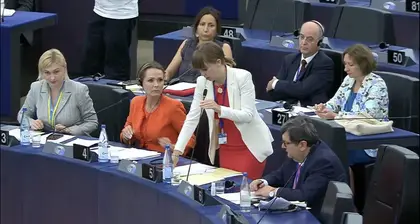The Russian lobby in the world is still strong, despite numerous sanctions and almost a year and a half since the full-scale military invasion of Ukraine began. In many European countries, there are still politicians who are undecided about their position on Russia, and some openly whitewash the actions of the Putin regime.
In addition to domestic political influence, Russian propaganda also plays a role outside its borders. At the beginning of the full-scale invasion, the Kremlin’s main propaganda outlets were blocked in many countries. However pro-Russian influence on Western society still exists through alternate channels and opinion leaders. Fighting this is a key task for our politicians, using all available platforms.
JOIN US ON TELEGRAM
Follow our coverage of the war on the @Kyivpost_official.
While the UN can’t decide what is more important to it, security on the European continent or Russia as a permanent member of the Security Council, other institutions haven’t been silent on the Ukrainian issue. This is largely due to Ukraine’s active position in the international arena, but if we consider the UN as an organization that should care about security and peace in the world, then, unfortunately, our efforts aren’t enough.
While the average Ukrainian citizen is unlikely to be deeply interested in the activities of the Parliamentary Assembly of the Council of Europe (PACE), this organization has the power to influence international processes in support of Ukraine.

Putin Hints Precondition for Peace Talks: Neutered Ukraine
In June, I took part in a PACE session, in which Russia’s military aggression finally made the agenda, and we managed to achieve some positive results.

In particular, we produced a document that provides for the recognition of Russia’s guilt in war crimes, and ecocide, as well as the need to create a public register of companies working for the benefit of the Russian Federation. In addition, it was about organizations like the Wagner PMC, which should be recognized as terrorist groups. Another very important point is support for Ukraine’s accession to NATO.
There are many parallels between the actions of the modern Russian Federation and the Third Reich, particularly in the information component.
I’ve submitted amendments concerning the issue of sanctions against Russia. I’m pleased to say that our European partners didn’t turn away at this crucial moment, didn’t start playing some kind of “diplomacy,” but supported them and included them in the resolution. What are the details of these amendments?
First and foremost, the amendments introduce international recommendations for financial institutions to thoroughly assess risks for clients. Some individuals and legal entities are still cooperating with companies that have direct or indirect ties to Russia without realizing the reputational and sanctions risks for themselves.
Another amendment introduces reliable tracking and verification systems to ensure that certain goods or materials that are subject to sanctions do not enter Russia through certain channels. This involves conducting audits and working with industry partners to prevent the circumvention of the ban on certain goods and components used by the aggressor country in the production of weapons and ammunition.
The Council of Europe is, in fact, the only organization that has taken concrete steps to support Ukraine. It was PACE that became the first major international organization to recognize the Russian regime as a terrorist state, and the Wagner PMC as a terrorist organization, at least on paper. And the organization’s priorities for 2024-2027 state that all countries should support Ukraine and recognize the responsibility for crimes committed by Russia.
The main task is to prevent the aggressor from escaping indictment for its crimes by establishing a special International Tribunal. The Council of Europe also wants to take control of the situation with children illegally taken to the Russian Federation.
Finally, it’s important to add the fight against disinformation to this whole package of efforts. I emphasized that people in our occupied territories – in Crimea and the uncontrolled territories of Donbas – often face this situation. After all, our citizens there have been living with the aggressor’s information agenda for nine years. The picture they were shown resembles a kingdom of crooked mirrors. War crimes are either justified or the responsibility for them is shifted to Ukraine.
Russia’s powerful position in the information field is not limited only to where it monopolistically controls the channels of communication with the population. This process is also evident in European countries, where Russian narratives are actively promoted and quickly find support among left-wing organizations, including political parties.
We still have an important social layer of work to do after the liberation of all Ukrainian territories. This is a struggle for the minds and thoughts of our people. The process of information detoxification needs to start now.
There are many parallels between the actions of the modern Russian Federation and the Third Reich, particularly in the information component.
However, if humanity was able to prove the horrific crimes and the impact of disinformation on international society 80 years ago, then there is every chance of doing so today. And the role of international organizations in this story should become a leading one.
You can also highlight the text and press Ctrl + Enter










